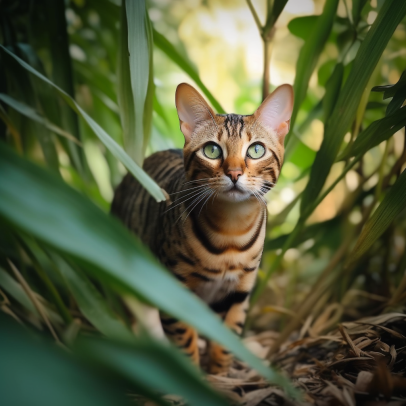Unveiling the Enigmatic Bengal Cat: A Fascinating Journey into Their World

Introduction
What are Bengal Cats?
Bengal cats are a unique and captivating breed known for their striking appearance and wild ancestry. They are a crossbreed between domestic cats and the Asian leopard cat, resulting in a breed that displays distinct markings and a muscular body. Bengal cats are often recognized for their beautiful, leopard-like spots and marbled patterns, which can come in various colors, including brown, silver, and snow. With their playful nature and innate curiosity, Bengal cats have gained popularity as fascinating companions.
Origin and History
The history of Bengal cats traces back to the 1960s when a cat breeder named Jean Mill aimed to create a domestic cat breed with the appearance of the Asian leopard cat. She successfully bred early generations of Bengal cats by crossing Asian leopard cats with Egyptian Maus, Abyssinians, and domestic shorthairs. Through dedicated breeding efforts, the Bengal cat breed was established, and its popularity grew steadily over the years. Today, Bengal cats are recognized by various cat registries worldwide and have become a beloved breed among cat enthusiasts.
Bengal Cat Appearance
The appearance of Bengal cats is undeniably captivating. They have a medium to large-sized body with a muscular build, showcasing their athleticism. One of their distinctive features is their coat, which can have either spotted or marbled patterns. The spots can vary in size and shape, resembling the rosettes of a leopard or the marbling of a jaguar. Bengal cats also have a short, dense, and soft coat that is remarkably low-maintenance compared to other long-haired breeds. Their eyes are usually large and expressive, ranging in color from gold to green, further adding to their stunning appearance.
Bengal Cat Personality and Temperament
Active and Energetic Nature
Bengal cats are known for their high energy levels and playful nature. They have a natural instinct for exploration and love to engage in interactive activities. These cats thrive in environments that provide them with ample opportunities for physical and mental stimulation. Bengal cats enjoy playing with toys, climbing on cat trees, and even learning new tricks. Their active and energetic nature makes them an ideal companion for individuals or families who can provide them with the necessary outlets for their energy.
Social Behavior and Interaction
Despite their wild appearance, Bengal cats are generally sociable and enjoy human companionship. They often form strong bonds with their owners and like to be involved in their daily activities. Bengal cats are known to be highly interactive and may seek attention by following their owners around the house or engaging in play. They are typically curious and intelligent, which can make them excellent problem-solvers. However, it's important to note that individual personalities may vary, and some Bengal cats may have different socialization needs.
Trainability and Intelligence
Bengal cats are highly intelligent and can be trained to learn various commands and tricks. They have a natural curiosity and eagerness to explore their environment, making them receptive to training methods that involve positive reinforcement. Bengal cats can be taught to use litter boxes, walk on a leash, and even play interactive games. It's important to provide mental stimulation through puzzle toys or training sessions to keep their active minds engaged and prevent boredom.
Bengal Cat Care and Maintenance
Diet and Nutrition
Proper nutrition is essential for the health and well-being of Bengal cats. A balanced and high-quality diet, preferably formulated specifically for cats, should be provided to meet their nutritional needs. Bengal cats are carnivorous, and their diet should primarily consist of protein sources such as meat or high-quality commercial cat food. Consult with a veterinarian to determine the appropriate feeding schedule and portion sizes based on the cat's age, weight, and activity level.
Grooming and Coat Care
Bengal cats have a short, dense coat that requires minimal grooming compared to long-haired breeds. Regular brushing with a soft bristle brush or a grooming glove helps remove loose hair and maintain the coat's shine. Bathing is generally not required unless the cat gets excessively dirty. However, it's essential to regularly check and clean their ears, trim their nails, and brush their teeth to ensure overall hygiene and prevent any potential issues.
Exercise and Playtime
Given their active nature, Bengal cats need regular exercise and playtime to keep them physically and mentally stimulated. Interactive play sessions with toys that mimic hunting behavior are highly beneficial. Engaging in daily play sessions not only provides an outlet for their energy but also strengthens the bond between the cat and its owner. Providing climbing structures, scratching posts, and puzzle toys can further enrich their environment and prevent boredom.
Bengal Cat Health and Common Issues
Common Bengal Cat Health Problems
While Bengal cats are generally healthy, like any other breed, they may be prone to certain health issues. Some common health problems that can affect Bengal cats include hypertrophic cardiomyopathy (a heart condition), progressive retinal atrophy (an eye disorder), and patellar luxation (a knee joint problem). Regular veterinary check-ups and preventive care can help detect and manage any potential health concerns early on.
Vaccinations and Preventive Care
Maintaining a routine vaccination schedule is crucial for Bengal cats to protect them from various infectious diseases. Vaccinations typically cover illnesses such as feline panleukopenia, feline herpesvirus, and feline calicivirus. Additionally, preventive care measures, including regular flea and tick control, deworming, and annual health check-ups, play a vital role in ensuring the overall well-being of Bengal cats.
Choosing a Veterinarian
Selecting a reputable veterinarian experienced in feline care is essential for providing the best healthcare for Bengal cats. Consider seeking recommendations from other Bengal cat owners or local cat clubs. A knowledgeable veterinarian can provide expert advice, perform routine check-ups and vaccinations, and address any health concerns promptly. Building a strong and trusting relationship with a veterinarian is crucial for the long-term health and happiness of a Bengal cat.
Bengal Cats as Family Pets
Compatibility with Children
Bengal cats can generally get along well with children, but proper introductions and supervision are necessary. Teaching children how to interact with cats, including gentle handling and respecting their boundaries, is crucial. Bengal cats thrive in a positive and nurturing environment where they feel safe and loved by all family members.
Interaction with Other Pets
With proper socialization and gradual introductions, Bengal cats can coexist with other pets, including dogs and other cats. Early socialization plays a vital role in ensuring positive interactions. Supervision is important during initial introductions, and providing separate spaces for each pet can help them adjust and form positive relationships over time.
Creating a Bengal-friendly Environment
Creating a Bengal-friendly environment involves providing ample opportunities for physical and mental stimulation. This can include providing vertical spaces like cat trees, interactive toys, and scratching posts. Bengal cats also enjoy access to windows where they can observe the outside world and experience the stimulation of natural light. Creating a safe and enriching environment is key to promoting their well-being and preventing destructive behavior.
Bengal Cat Breeding and Ownership Considerations
Responsible Breeding Practices
If considering breeding Bengal cats, it is important to adhere to responsible breeding practices. This includes selecting healthy cats with desirable traits, obtaining appropriate genetic testing to identify potential health issues, and ensuring proper care and socialization for both the breeding cats and their offspring. Responsible breeding aims to improve the breed's overall health and temperament.
Finding a Reputable Bengal Cat Breeder
When acquiring a Bengal cat, it is crucial to find a reputable breeder who prioritizes the health and well-being of their cats. A reputable breeder will conduct proper health screenings, provide a clean and safe environment for their cats, and be transparent about the breed's characteristics and potential challenges. Researching and visiting multiple breeders, asking for references, and observing the living conditions of the cats are all important steps in finding a responsible breeder.
Preparing for Bengal Cat Ownership
Before bringing a Bengal cat home, it is important to prepare the necessary supplies, such as a litter box, food and water bowls, scratching posts, toys, and a comfortable bed. Bengal cats thrive in environments with plenty of vertical spaces, so providing cat trees or shelves for climbing is beneficial. Ensuring a safe and cat-proofed home environment, as well as setting aside time for play and interaction, will help make the transition into Bengal cat ownership smooth and enjoyable.
Frequently Asked Questions about Bengal Cats
Are Bengal Cats Hypoallergenic?
Contrary to popular belief, Bengal cats are not hypoallergenic. While they may produce fewer allergens compared to some other cat breeds, they still produce allergenic proteins that can trigger allergic reactions in sensitive individuals. It is recommended to spend time with a Bengal cat before bringing one home to see if any allergic reactions occur.
Do Bengal Cats Shed a Lot?
Bengal cats have a short and dense coat that generally does not shed excessively. However, shedding can still occur, especially during seasonal changes. Regular brushing can help minimize shedding and keep their coat healthy and sleek.
Are Bengal Cats Suitable for First-time Owners?
Bengal cats can be suitable for first-time cat owners, provided they are prepared to meet their needs for activity, mental stimulation, and social interaction. It is important to research and understand the breed's characteristics, invest time in training and socialization, and provide a stimulating environment for their well-being.
Conclusion
In conclusion, Bengal cats are truly fascinating companions that bring a touch of the wild into our homes. With their unique appearance, active nature, and playful personalities, Bengal cats captivate the hearts of many cat lovers. Understanding their origin, appearance, and temperament helps create a strong foundation for a fulfilling relationship with these special feline friends. Proper care and maintenance, including a balanced diet, grooming, and regular exercise, are essential for their well-being. Being aware of common health issues, choosing a reputable veterinarian, and ensuring preventive care are crucial for keeping Bengal cats healthy and happy. As family pets, Bengal cats can coexist with children and other pets, given proper introductions and a supportive environment. Responsible breeding practices and finding reputable breeders contribute to the overall improvement and welfare of the breed. Whether you're a first-time owner or an experienced cat lover, Bengal cats can bring joy, companionship, and a touch of the wild into your life, making them a truly unique and delightful addition to any loving home.

